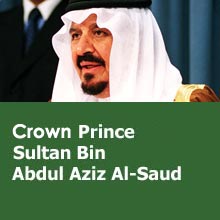Crown Prince Sultan first entered the Saudi government when he was appointed Governor of Riyadh Region in 1947. In 1963 he was called up to head the powerful Ministry of Defense and Aviation. Under his guidance, Saudi Arabia strengthened and modernized its military forces while conducting a brisk arms trade with both the U.S. and the United Kingdom. Prince Sultan is also reported to have built much of his considerable wealth on large commissions recouped from government arms purchases.
Since the terrorist attacks of 9/11, in which 15 of the 19 hijackers were Saudi nationals, the kingdom’s relations with the U.S. have become more difficult and convoluted. In late 2001, Prince Sultan denied the United States the use of Saudi bases to stage military strikes on Afghanistan. At the time he said, “We will not accept in our country even a single soldier who will attack Muslims or Arabs.” However, it was revealed after the Iraq War that the kingdom allowed allied forces to operate from at least three air bases within its borders and provided cheap fuel.
Prince Sultan is also known for his humanitarian and philanthropic contributions. He established a charity foundation in his name to support socially beneficial projects in medicine, science, technology, and education.�Unfortunately, the Prince’s philanthropic efforts haven’t always earned him praise: in August of 2002 he was sued by the families of September 11 victims for contributions he allegedly made to charities with ties to al-Qaeda.
Elevated to the rank of Crown Prince after King Fahd’s death in 2005, concerns over the aging Sultan’s health have caused some to question when Saudi leadership will be passed on to the younger “second generation” princes.
- Previous: King Abdullah Ibn Abdul Aziz A...



